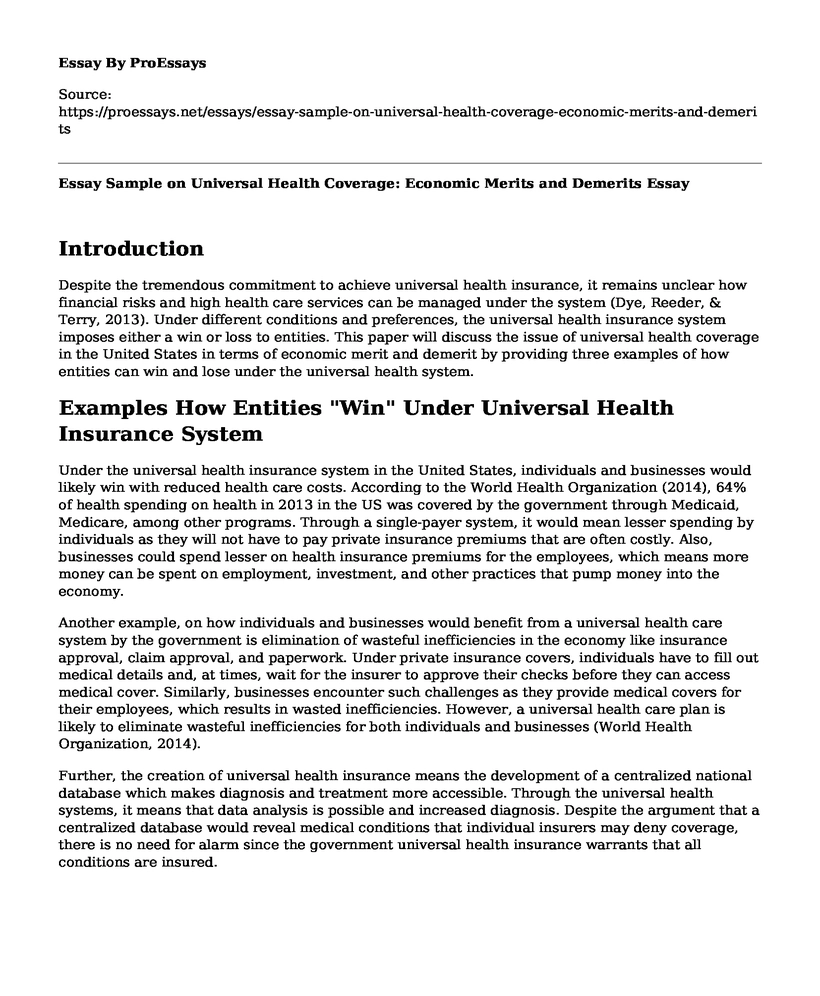Introduction
Despite the tremendous commitment to achieve universal health insurance, it remains unclear how financial risks and high health care services can be managed under the system (Dye, Reeder, & Terry, 2013). Under different conditions and preferences, the universal health insurance system imposes either a win or loss to entities. This paper will discuss the issue of universal health coverage in the United States in terms of economic merit and demerit by providing three examples of how entities can win and lose under the universal health system.
Examples How Entities "Win" Under Universal Health Insurance System
Under the universal health insurance system in the United States, individuals and businesses would likely win with reduced health care costs. According to the World Health Organization (2014), 64% of health spending on health in 2013 in the US was covered by the government through Medicaid, Medicare, among other programs. Through a single-payer system, it would mean lesser spending by individuals as they will not have to pay private insurance premiums that are often costly. Also, businesses could spend lesser on health insurance premiums for the employees, which means more money can be spent on employment, investment, and other practices that pump money into the economy.
Another example, on how individuals and businesses would benefit from a universal health care system by the government is elimination of wasteful inefficiencies in the economy like insurance approval, claim approval, and paperwork. Under private insurance covers, individuals have to fill out medical details and, at times, wait for the insurer to approve their checks before they can access medical cover. Similarly, businesses encounter such challenges as they provide medical covers for their employees, which results in wasted inefficiencies. However, a universal health care plan is likely to eliminate wasteful inefficiencies for both individuals and businesses (World Health Organization, 2014).
Further, the creation of universal health insurance means the development of a centralized national database which makes diagnosis and treatment more accessible. Through the universal health systems, it means that data analysis is possible and increased diagnosis. Despite the argument that a centralized database would reveal medical conditions that individual insurers may deny coverage, there is no need for alarm since the government universal health insurance warrants that all conditions are insured.
Examples How Entities "Lose" Under Universal Health Insurance system
Correspondingly, individuals and businesses are likely to lose under universal health systems. For instance, a government universal health insurance system would mean higher taxes for both people and companies. Since health care remains costly, the expenses for the care need payments. It means, for the government to offer cover for the Americans, taxes would have to be higher, and funds may be reduced from other significant areas like education and research (Dye et al., 2013).
Another example of how people and organizations lose under the single-payer systems involves the rationing of health care services, drugs, and equipment by the government. With a universal health insurance system, it increases the chances of influence by the philosophical difference of individuals in power or politics, which would affect what and who gets a particular health care requirement. In some way, costs would be out of control hence negatively affecting entities.
Additionally, entities would lose under the universal health insurance system since it would mean a drastic transition. Because of the universal health insurance plan, the health insurance sector would be irrelevant which mean that companies would have to go out of business imposing a painful transition to employed individuals and business operating in the health insurance sector.
Personal Preference for Single-Payer System vs. a Free-Market Health Care
In the United States health care industry, I prefer a free-market health insurance system over the single-payer health care system. The free-market health system allows consumer sovereignty as the health care goods and services prices are freely developed by agreement between health care providers and patients, which could promote affordability. In a free-market health system, there is the absence of bureaucracy and optimal allocation of resources different from universal health care, which limits payout to health care providers while increasing taxes and costs (Dye et al., 2013).
References
Dye, C., Reeder, J., & Terry, R. (2013). Research for Universal Health Coverage. Science Translational Medicine, 5(199), 199ed13-199ed13.doi:10.1126/scitranslmed.3006971
World Health Organization. (2014). Research for Universal Health Coverage: World Health Report 2013. [pdf]. Geneva: W.H.O. Retrieved from http://apps.who.int/iris/bitstream/10665/85761/2/9789240690837_eng.pdf?ua=1.
Cite this page
Essay Sample on Universal Health Coverage: Economic Merits and Demerits. (2023, Apr 08). Retrieved from https://proessays.net/essays/essay-sample-on-universal-health-coverage-economic-merits-and-demerits
If you are the original author of this essay and no longer wish to have it published on the ProEssays website, please click below to request its removal:
- Capital Acquisition Paper Example
- Asthma Policy in Affordable Care Act Essay
- Paper Example on Drug Testing: Medical Marijuana & HR Debate
- HELLP Syndrome in Pregnant Women: Risks, Effects & Prevention - Essay Sample
- Blockchain-Based Governance - Essay Sample
- Essay on J.P Morgan: Leading B2B and B2C Bank, Understanding Market Demands
- Paper Example on Syphilis: An STD Caused by Treponema Pallidum







